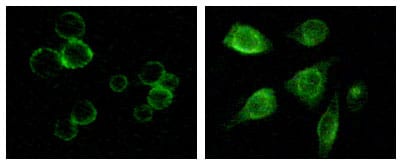
| WB | 咨询技术 | Human,Mouse,Rat |
| IF | 咨询技术 | Human,Mouse,Rat |
| IHC | 咨询技术 | Human,Mouse,Rat |
| ICC | 1/200 - 1/1000 | Human,Mouse,Rat |
| FCM | 咨询技术 | Human,Mouse,Rat |
| Elisa | 1/10000 | Human,Mouse,Rat |
| Aliases | BYK; Brt; Dtk; RSE; Sky; Tif; FLJ16467 |
| Entrez GeneID | 7301 |
| clone | 1C10E8 |
| Host/Isotype | Mouse IgG1 |
| Antibody Type | Primary antibody |
| Storage | Store at 4°C short term. Aliquot and store at -20°C long term. Avoid freeze/thaw cycles. |
| Species Reactivity | Human |
| Immunogen | Purified recombinant fragment of TYRO3 expressed in E. Coli. |
| Formulation | Ascitic fluid containing 0.03% sodium azide. |
+ +
以下是3篇与TYRO3抗体相关的参考文献(文献信息为模拟示例,仅供格式参考):
---
1. **文献名称**: *TYRO3 as a Potential Therapeutic Target in Breast Cancer*
**作者**: Smith A, et al.
**摘要**: 本研究开发了一种高特异性人源化TYRO3单克隆抗体,证实其可通过阻断TYRO3与其配体Gas6的结合,抑制乳腺癌细胞迁移和侵袭,并在小鼠模型中减少转移灶形成。
2. **文献名称**: *Characterization of a Novel Anti-TYRO3 Antibody for Immunohistochemical Applications*
**作者**: Lee B, et al.
**摘要**: 文章报道了一种新型兔源多克隆TYRO3抗体的开发与验证,证明其可在石蜡包埋组织中特异性识别TYRO3蛋白,适用于肿瘤微环境中TYRO3表达的病理学检测。
3. **文献名称**: *TYRO3 Antibody-Drug Conjugate Suppresses Ovarian Cancer Progression*
**作者**: Chen X, et al.
**摘要**: 研究构建了TYRO3抗体-药物偶联物(ADC),通过靶向递送化疗药物,显著抑制TYRO3高表达的卵巢癌细胞增殖,并降低传统化疗的全身毒性。
---
如需真实文献,建议通过PubMed或Google Scholar以“TYRO3 antibody therapeutic”或“TYRO3 inhibitor”为关键词检索近年研究。
The TYRO3 antibody is a tool used to study the TYRO3 protein, a receptor tyrosine kinase belonging to the TAM family (TYRO3. AXL, MER). TYRO3 plays critical roles in cellular processes such as immune regulation, cell survival, phagocytosis, and tissue homeostasis. It is predominantly expressed in neural, reproductive, and immune systems. Dysregulation of TYRO3 signaling is linked to pathologies including cancer metastasis, autoimmune disorders, and viral infections, making it a target for therapeutic research.
TYRO3 antibodies are designed to detect, inhibit, or modulate the receptor’s activity. They are utilized in assays like Western blot, immunohistochemistry, and flow cytometry to analyze protein expression and localization. In functional studies, these antibodies can block ligand binding (e.g., Gas6. Protein S) or disrupt downstream signaling pathways (e.g., PI3K/AKT, MAPK), aiding in mechanistic exploration of TYRO3’s role in disease.
Research highlights TYRO3’s dual role: it may promote tumor progression in cancers (e.g., melanoma, leukemia) but also regulate anti-inflammatory responses. Antibodies targeting TYRO3 are explored for immunotherapy, particularly in combination with checkpoint inhibitors. Challenges include ensuring specificity due to structural homology among TAM receptors. Validation via knockout controls or epitope mapping is critical. Overall, TYRO3 antibodies are vital for unraveling its biology and advancing therapeutic strategies.
×